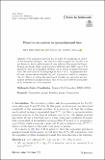Files in this item
Primitive normalisers in quasipolynomial time
Item metadata
| dc.contributor.author | Chang, Mun See | |
| dc.contributor.author | Roney-Dougal, Colva Mary | |
| dc.date.accessioned | 2021-11-04T12:30:02Z | |
| dc.date.available | 2021-11-04T12:30:02Z | |
| dc.date.issued | 2021-10-26 | |
| dc.identifier | 275954601 | |
| dc.identifier | ae4dc6e4-2965-42d6-aed0-08d99a2741fe | |
| dc.identifier | 85118115584 | |
| dc.identifier | 000711372500001 | |
| dc.identifier.citation | Chang , M S & Roney-Dougal , C M 2021 , ' Primitive normalisers in quasipolynomial time ' , Archiv der Mathematik , vol. First Online , ADMA-D-21-00337 . https://doi.org/10.1007/s00013-021-01670-5 | en |
| dc.identifier.issn | 0003-889X | |
| dc.identifier.other | ORCID: /0000-0002-0532-3349/work/102725171 | |
| dc.identifier.other | ORCID: /0000-0003-2428-6130/work/102725804 | |
| dc.identifier.uri | https://hdl.handle.net/10023/24258 | |
| dc.description | Funding: The first author is supported by a Royal Society grant (RGF\EA\181005). | en |
| dc.description.abstract | The normaliser problem has as input two subgroups H and K of the symmetric group Sn, and asks for a generating set for NK(H): it is not known to have a subexponential time solution. It is proved in [Roney-Dougal & Siccha, 2020] that if H is primitive then the normaliser problem can be solved in quasipolynomial time. We show that for all subgroups H and K of Sn, in quasipolynomial time we can decide whether NSn(H) is primitive, and if so compute NK(H). Hence we reduce the question of whether one can solve the normaliser problem in quasipolynomial time to the case where the normaliser in Sn is known not to be primitive. | |
| dc.format.extent | 7 | |
| dc.format.extent | 295351 | |
| dc.language.iso | eng | |
| dc.relation.ispartof | Archiv der Mathematik | en |
| dc.subject | Computation | en |
| dc.subject | Primitive groups | en |
| dc.subject | Permutation groups, | en |
| dc.subject | QA Mathematics | en |
| dc.subject | T-NDAS | en |
| dc.subject.lcc | QA | en |
| dc.title | Primitive normalisers in quasipolynomial time | en |
| dc.type | Journal article | en |
| dc.contributor.sponsor | The Royal Society | en |
| dc.contributor.institution | University of St Andrews. Pure Mathematics | en |
| dc.contributor.institution | University of St Andrews. Centre for Interdisciplinary Research in Computational Algebra | en |
| dc.contributor.institution | University of St Andrews. St Andrews GAP Centre | en |
| dc.contributor.institution | University of St Andrews. School of Computer Science | en |
| dc.identifier.doi | https://doi.org/10.1007/s00013-021-01670-5 | |
| dc.description.status | Peer reviewed | en |
| dc.identifier.grantnumber | RGF\EA\181005 | en |
This item appears in the following Collection(s)
Items in the St Andrews Research Repository are protected by copyright, with all rights reserved, unless otherwise indicated.

